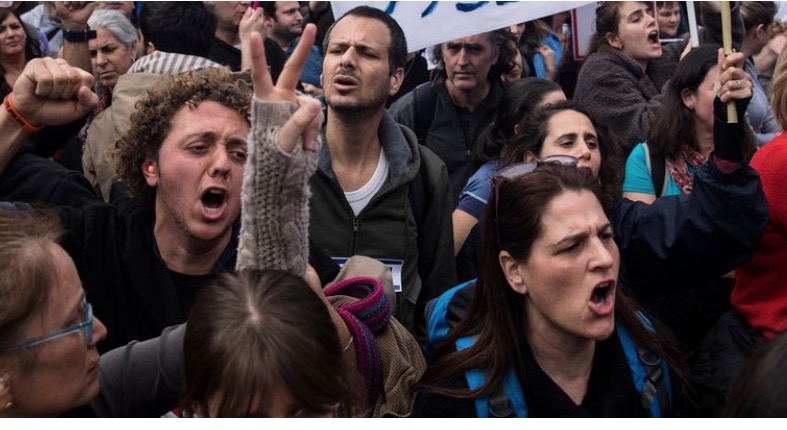Comments
ISRAEL PROTESTS - Massive protests erupted in Israel on Monday as the country's far-right government, led by Prime Minister Benjamin Netanyahu, began advancing judicial reforms that would roll back judicial oversight of parliament and give lawmakers more control over Supreme Court appointments, proposed changes that opposition leader Yair Lapid decried as an attempt to impose a "dark dictatorship."
As demonstrations raged—with participants chanting "democracy!" and "no to dictatorship!"—chaos broke out inside the Israeli Knesset after a key committee voted to move ahead with part of the legislation backed by Netanyahu and right-wing Israeli Justice Minister Yariv Levin, who are aiming to virtually eliminate the Supreme Court's ability to strike down laws.
The vote, as The New York Times reported, "set off a fracas in the committee room after opposition lawmakers, one of them in tears, chanted against the decision, and some of them clambered over tables to confront the committee chair, Simcha Rothman, a government lawmaker."
Around 100,000 people took part in the Monday demonstrations against the proposed judicial overhaul, which the far-right government appears bent on ramming through despite public opposition and pleas from top officials—including Israeli President Isaac Herzog—to delay the legislation.
In a speech on Sunday, Herzog—who plays a largely ceremonial role—warned that "we are no longer in a political debate but on the brink of constitutional and social collapse."
Addressing demonstrators on Monday, Lapid expressed a similar fear, declaring, "We will not stay quiet as they destroy everything that is precious and sacred to us."
"Outwardly they grin sarcastically, saying that [the protests] won't change anything," Lapid said, "but inside they tremble, as rulers always tremble when they discover that there are people in front of them who are not willing to give up."
Monday's mass demonstrations came 24 hours after around 200,000 Israelis took to the streets to protest the policies of Israel's far-right government, which on Sunday granted retroactive "legalization" to nine settlements in the occupied West Bank and East Jerusalem.
The Times noted Monday that "many Arabs agree that the Supreme Court generally acts as a bulwark against attacks on minorities and has acted to restrain parts of Israel's settlement enterprise."
"But they also feel that Israel's democracy has for years been compromised by the Israeli occupation of the West Bank, where millions of Palestinians live under varying forms of Israeli control without voting or residency rights in Israel itself," the newspaper added.
Aida Touma-Sliman, an Arab lawmaker in Israel's parliament, told the Times that "democracy cannot exist while you're occupying other people."
Mansour Abbas, a member of the Israeli Knesset and head of the United Arab List, said his party supports the large-scale demonstrations against the judicial overhaul, which have been going on for weeks.
As Haaretz explained, the new legislation seeks to grant "the prime minister and his or her government—via the legislature they control—the power to override Supreme Court decisions."
"It also limits the court's ability to strike down legislation that infringes on human and civil rights, while giving the government complete control over judicial appointments," the outlet continued. "The battle will continue after Monday's vote. The legislation now moves to the full Knesset, where it will need to pass in three votes in the coming days or weeks. The protest movement is already preparing its next steps."
(Jake Johnson is a staff writer for Common Dreams where this article was first published.)















